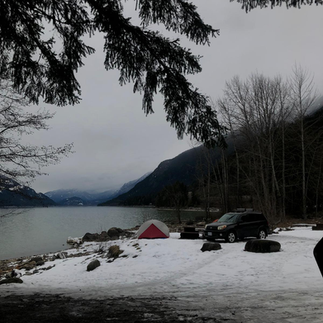Winter Front Country Camping: Tips, Insights, and Our Top Gear Picks
- This Maple Life
- Jan 30, 2024
- 5 min read
Updated: Feb 25, 2024
British Columbia is a utopia for camping enthusiasts. It is an outdoor lover's dream come true because of the abundance of forests, mountains, lakes, rivers, and, of course, the ocean.
Despite the popular belief that winter isn’t for camping, with the proper equipment and mindset, winter front country camping can actually provide you with some of the best camping memories there are.
Therefore, get ready for some cozy hacks, tips, and our absolute favourite gear picks to strengthen your winter camping game. Whether you're a seasoned pro or a snow-curious newbie, we've got you covered.
Table of Contents
Winter Front Country Camping Tips
Check Weather Reports:
It is important to be aware of the temperature you will be dealing with and the amount of rain, if any, that you might encounter to be better prepared.
Select Campground:
There are plenty of places that will be open during the colder months and have a clear path for visitors. Depending on the campground, you will still need to make reservations, but usually within shorter periods of time.
Check out our post: Five Cool Winter Camping Spots Near Vancouver, to find the perfect winter site.
Bring Weather-Appropriate Gear:
This goes from your garments to your tent; the importance of having a warm night's sleep is high to ensure that you will be sleeping comfortably. Dress in layers, wear a waterproof, breathable outer layer to hang out, wear wool and a winter sleeping bag to sleep.
My suggestions are that you also bring a canopy or tarp should the weather turn rainy.
Wear the Right Footwear:
As foot wear goes, bring some comfy shoes, but also check their waterproofness. Even if there is no rain in the forecast, chances are the conditions will still be humid. Pack other shoes depending on the activities planned, and if the conditions call for it or your feet run cold, also bring your snow boots.
Tent Placement:
The best sites are those closest to the water; however, bear in mind that these areas typically experience higher winds, which contribute to chillier nights.
Select protected locations with lots of trees around whenever you can to reduce the amount of wind. A shovel will become handy if your spot has snow and you wish to level it to place your tent.
Fire Essentials:
Making a fire in wetter conditions can be a challenge. Depending on how cold it is, sometimes lighters can be finicky to use. Make sure you also pack matches in a ziploc or waterproof bag to have a back-up.
Always purchase dry wood, and don't forget your hatchet.
Extra tip: If you want to step up your fire game, consider chemical fire starters and even mini-torches. They are a game changer.
Foam Pad:
Foam pads are an important item to help insulate your tent, and you can also use them as sitting pads to keep you warm.
Bring the Blankets:
One of the advantages of vehicle camping is that you can pack as much as you want or need, I don't really get shy about the amount of blankets I bring, especially on a freezing night. The more, the merrier.
Keeping Warm:
There are campgrounds with power services that are open in the winter months, but not all of them offer that service. When that is the case, there are a few things to remember, so you can keep warm: besides what we already discuss; drink plenty of water, make warm foods and drinks, and move whenever possible. In the tent, besides the wool layers and sleeping bag, wear toques and gloves if needed.
Other Essentials:
Colder weather will drain electronic batteries, so, bring extra batteries and charges with the proper vehicle adapter.
Cellphone reception is low even in front country campgrounds, so for emergency purposes, it is never a bad idea to consider bringing a satellite communication device such as a personal locator beacon or satellite phone.
Don't forget the bear spray!
Winter Front Country Camping Insights
Plan Ahead:
A well-prepared camping trip will help you have an amazing time, even if the weather turns out to be different than originally expected.
Don't seal your tent:
While it is true that winter can be very chilly, resist the impulse to totally seal your tent, as this will simply lead to condensation and the possibility of waking up in a puddle of water.
Ventilation is always key to having a dry bed.
Keep your Camp Secure:
Ensure that everything in your camp that could be easily blown away by the wind is secured before turning in for the night or leaving the site for the day.
You Will Get Wet:
Maybe not, but plan ahead and pack spare clothes in case the ones you're wearing get wet. Alternatively, you can place the wet clothes on top of your base layer and use your body to dry them.
Winter Front Country Camping Top Gear Picks
When camping in the winter, it is imperative to stay warm, so for the West Coast winters, that can be challenging due to humidity and rain. With this in mind here are our top gear picks for winter front country camping:
Wool:
Wool is an amazing fabric to wear at any season. In winter, it will keep you warm even if you get wet, so it is a favorite of ours. My suggestion is that you get at least your base layer and socks from this material.
Down:
If the weather is mostly dry, wearing down jackets is the best bet to stay warm and comfortable during your stay. Aimed for a 750 fill for a cozier and warmer jacket, just keep it away from fire sparks.
Goretex:
We love Goretex because it is windproof, waterproof, and breathable, and you can get all the gear from gloves, to shoes, jackets and more to stay dry in the winter months.
Sleeping bag:
This item is an important piece for you to stay warm while you sleep, and it is advisable to choose a lower-rated temperature sleeping bag than the lowest temperature at your campsite. Sometimes a three-season sleeping bag (spring, summer and fall) will do for winter front country camping, but everything depends on the weather and how warm or cool you like to sleep.
Tent:
It is a good idea to choose a 3- to 4-season tent to withstand wetter and colder weather, and you don't have to spend a lot of money on a decent tent. Nowadays, there are cheaper options that will keep you dry and warm without breaking the bank. Having said that, there are also winter tents that will keep you toasty if you want to invest a little more and sleep cozier.
Water Repellent Spray:
It is advisable to treat your gear to enhance its waterproofness and performance.
We have been using Nikwax, which has worked for us and can be used on Goretex, Sympatex, eVent and many other fabrics, as well as shoes. There are different types, so check the labels to meet your needs.
If you want to learn more about sleeping bags and tent ratings, shapes, and average prices, check our post on Camping Start-Up Gear: Essentials, Add-Ons and an Approximate Budget
To Wrap Up
If you were curious about winter camping, we hope that this post has brought you closer to the magic of stepping out of your comfort zone. Just think about all the good reasons that winter camping can offer, for instance: no mosquitoes, no fire bans, more relaxation, and fewer crowds. If that sounds enticing, we hope that you give it a try and enjoy the colder season out in nature.
And if you are curious about what you'll need for a winter backcountry camping trip, don't forget to check out our prior post: Winter Backcountry Camping: Tips, Insights, and Our Top Gear Picks
Enjoy!
_edited.png)



















This is super helpful! Thank you so much! <3